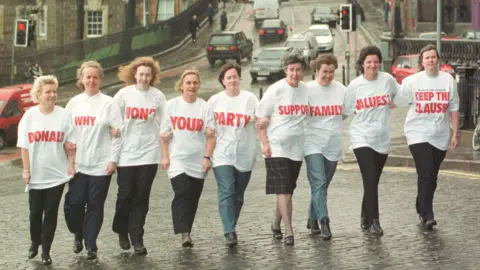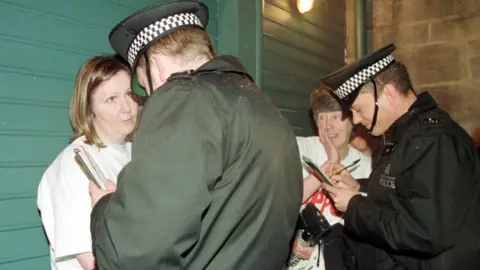Section 28: Death threats and Holyrood's 'first culture war'
 PA Media
PA MediaIt was rare for politicians to get death threats in 1999.
But former MSP Wendy Alexander says she found herself an "obvious target" during what she describes as the Scottish Parliament's first culture war – the battle to repeal a law commonly known as Section 28.
The law prohibited schools and councils from intentionally promoting homosexuality or the teaching of "the acceptability of homosexuality as a pretended family relationship".
"It was very unpleasant," she says. "There were death threats, which sadly have become more common to politicians, but in those days were mercifully rare. It was really incredibly febrile."
Section 28 – known as Section 2A in Scotland – was introduced by Margaret Thatcher's government in 1988 after an outcry sparked by reports about content in school books in London
Alexander – who is now a member of the House of Lords – describes the law as "pernicious".
 PA Media
PA MediaAnd 25 years on, she recalls how she and Scotland's "fledgling" parliament would take on the tabloid media and one of the country's richest men.
"You could label this as one of the first pieces of culture war legislation," she says.
"This was something that Mrs Thatcher put on the statute books because somebody didn't like, literally, a storybook, which had children growing up in a gay family.
"This was a story book that some London borough allegedly used, and this was a chance for Mrs Thatcher to commence a culture war."
She adds: "Because it banned local government from promoting homosexuality, what it did was make teachers very, very scared about being able to talk about relationships in schools.
"They were frightened that they would be accused of promoting homosexuality by virtue of talking to children who were confused about their sexuality or simply talking about the lives they saw around them, if it came up in personal education."
 PA Media
PA MediaIn 1997, the UK's new Labour government had pledged to abolish the law. And by 2000, it would fall to Scotland's new parliament to pass the vote.
Alexander was communities minister in Holyrood's first Scottish Executive when she received a call from Deputy Prime Minister John Prescott.
"He said: 'Wendy, we are about to embark on our manifesto commitment to abolish Section 28… If you want to repeal on the same timetable as England, you have to start now.'
"We announced in the October before, it was then the Queen's Speech in England, that we intended to repeal in Scotland. The consultation we ran was in favour of the repeal of Section 28 in Scotland as well."
However, while the majority of MSPs looked likely to vote to repeal Section 28 in Scotland, there were voices outside parliament opposed to the move.
 PA Media
PA MediaIn 2000, Brian Souter, founder of the Stagecoach Group, funded the "Keep the Clause" campaign that sought to prevent Section 28 from being abolished.
Backed by the Daily Record newspaper and several religious groups, the campaign ran a private postal referendum. It received more than 1.2 million responses, with more than 86% respondents voting to retain the ban.
Speaking after the result in May 2000, Mr Souter addressed MSPs via the media. He said: "We plead with you to respect parents' rights to nurture their children with their own beliefs and values.
"And we warn you that we will not stand back and allow a politically correct minority to undermine the important position of marriage and determine morality of the majority."
The BBC contacted Mr Souter for this article but he declined to comment.
 PA Media
PA MediaAlexander says: "Cardinal [Thomas] Winning at the time accused me of being the greatest threat to Christian unity in Scotland.
"Of course, the right thing was to try and take the temperature down. We were not interested in a crusade, but I was an obvious target at that time. I was young, single, I wasn't married, I didn't have kids.
"But we worked to give reassurance around guidelines to schools that fundamentally this was not about sex education, that the sex education guidelines were there, they were adequate."
"This was about society, recognizing that you don't honour marriage by denying the reality of other relationships which are equally well established and honourable."
In the end, the repeal was passed on 21 June 2000 – with 99 MSPs voting in favour and 17 against.
England and Wales would follow suit by repealing Section 28 in 2003.
"And of course within 10 years, it was forgotten," Alexander says.
"People, I think, are proud that Scotland became a more tolerant society and of course it laid the foundation for civil partnerships and then equal marriage, which again are well accepted."
The Scottish Conservatives had voted against the repeal, but before he became prime minister in 2010, the party's UK leader David Cameron apologised for Section 28, labelling it "offensive to gay people".
Alexander says: "I think it's important in these cases to hold your ground but to do so with humility and try and take people with you.
"And I think looking back we didn't always manage to take the country with us but the parliament stood firm."
 Getty Images
Getty ImagesAfter the bruising debate over Section 28, Wendy Alexander had a brief stint as Scottish Labour leader. She is currently a member of the House of Lords.
In her personal life, she married and had two children. In 2020, her husband came out as trans and she says they are now amicably divorced.
Referring to recent debates over trans right, she says: "In society we do have to be very, very careful not to stigmatise small minorities and certainly not weaponize them in a debate. I've watched this in my own family.
"I think the arc of progress bends long… Section 28 is instructive in the sense that there was a huge orchestrated media campaign of opposition to legislation that had overwhelming support in the elected parliament and that involved distortion.
"It was classically in the culture wars tradition - magnifying and weaponising an issue that stigmatised a community.
"Social media just happens to be the vehicle of choice these days. Twenty-five years ago, it was well funded tabloid campaigns funded by PR agencies and business people.
"I think the lesson is that, I suppose, it says we're all at risk of being intolerant to the minority," she says.
